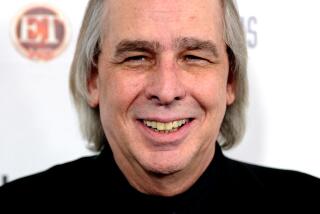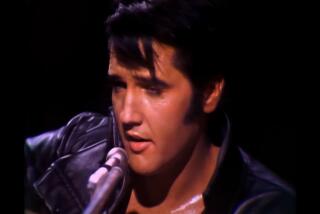BOOK REVIEW : Celebrating Radio in Passionate Detail : EMPIRE OF THE AIR; The Men Who Made Radio <i> by Tom Lewis</i> , HarperCollins $25, 416 pages
- Share via
T urn it up, turn it up, a little bit higher--radio! , sings Van Morrison, a man who understands the mystic fire of the wireless. Turn it up, burn it up--so you know, radio!
So, too, is the transcendental and transfiguring power of radio celebrated by Tom Lewis in “Empire of the Air,” although in a cerebral rather than an ecstatic mood. Still, Lewis captures the boom spirit that animated the men who invented radio, and he reminds us of the profound change in consciousness inspired by the new technology.
“The new medium of radio was to the printing press what the telephone had been to the letter: it allowed immediacy,” Lewis writes. “Radio became a ‘godlike presence’ . . . which had taken over American lives and homes.”
The story of radio, according to Lewis, is the saga of three men: Lee de Forest, who invented the key electronic components of radio; Edwin Howard Armstrong, who perfected the technology of radio transmission (including FM broadcasting); and David Sarnoff, founder of RCA and later NBC, who figured out how to parlay the technology of radio into a vast media empire.
In that sense, “Empire of the Air” is a triple biography--Lewis narrates the history of radio as a science and an industry; he describes the extraordinary blend of scam and genius that characterizes the American cult of invention.
Lewis is an English professor at Skidmore College, but he has all the skills and instincts of a historian, a gift for the clear description of complex technologies and a real passion for detail.
More to the point, Lewis is sensitive to the telling moments in a man’s life that prefigure his destiny. We peer into the journal of the adolescent De Forest and discover his troubled flirtation with a young black woman named Annie, “mingled as it was with both biblical and racial guilt.” And we soon come to understand that De Forest was condemned to a life of failed and frustrated love.
Armstrong, too, was haunted by demons of his own creation. Arrogant, distrustful and suspicious, he held back some of the secrets of his inventions when describing them to his own patent lawyer--and the flaws in his patent applications later resulted in long and bitter lawsuits. As an old man, at war with RCA over the patents, he imagined that his food was poisoned and insisted on having his stomach pumped.
“Unwittingly, Armstrong had written the opening scene of a tragedy of many acts,” Lewis explains, “in which he would be the chief protagonist.”
None of these men is especially ingratiating, but it turns out that each of them was driven by the same high-test fuel of ego, ambition and vision.
Young David Sarnoff, who relayed the first distress signals of the sinking Titanic , recognized the tragedy as a boon: “The Titanic disaster brought radio to the front,” Sarnoff loved to say, “and also me.” And all three of them saw the technology of radio as a tantalizing weapon for their own conquests: “The only footprints I will leave,” De Forest wrote to his mother, when he still in college, “will be my inventions.”
“Empire” is the companion volume to a new PBS program of the same title by Ken Burns of “The Civil War” and other remarkably lyrical documentaries. Lewis himself is not much given to the lyrical, and much less the mystical, but he tunes into the wonderment with which the world regarded radio in its early, exciting days--and the quiet magic that still rides on the radio waves.
“Do you not know the world is all now one single whispering gallery?” rhapsodized Woodrow Wilson in 1919, and Lewis lets us listen. “All the impulses of the mankind are thrown out upon the air and reach to the ends of the Earth.”
Next: Richard Eder reviews “Joe” by Larry Brown (Algonquin Books of Chapel Hill).
More to Read
Sign up for our Book Club newsletter
Get the latest news, events and more from the Los Angeles Times Book Club, and help us get L.A. reading and talking.
You may occasionally receive promotional content from the Los Angeles Times.










